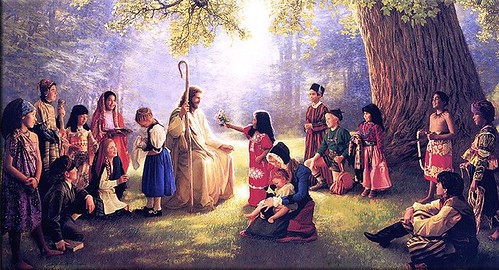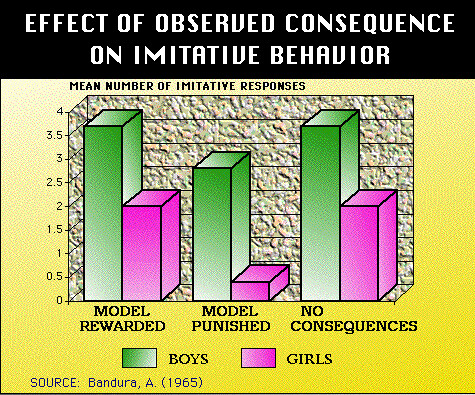
Observational learning is when one animal can watch the actions of another and learn from those actions. This may be as simple as learning the location of a food source or as complicated as learning a sequence of actions that needs to be taken to earn a reward. Many animals can do this; good experimental evidence is available for the common octopus, Octopus vulgaris, quail, rats, and a variety of primates.
Observational learning occurs when behaviour changes to imitate that of models. Work by Albert Bandura and colleagues has shown the power of both live and media models. Social learning theories have have argued that behaviour patterns in general are learned as a result of social reinforcements, punishments and models.
Required conditions
Observational learning occurs when behaviour changes to imitate that of models. Work by Albert Bandura and colleagues has shown the power of both live and media models. Social learning theories have have argued that behaviour patterns in general are learned as a result of social reinforcements, punishments and models.
Required conditions
Bandura called the process of social learning modelling and gave four conditions required for a person to successfully model the behaviour of someone else:
1. Attention to the model
A person must first pay attention to a person engaging in a certain behaviour (the model).
2. Retention of details
Once attending to the observed behaviour, the observer must be able to effectively remember what the model has done.
3. Motor reproduction
The observer must be able to replicate the behaviour being observed. For example, juggling cannot be effectively learned by observing a model juggler if the observer does not already have the ability to perform the component actions (throwing and catching a ball).
4. Motivation and Opportunity
The observer must be motivated to carry out the action they have observed and remembered, and must have the opportunity to do so. For example, a suitably skilled person must want to replicate the behaviour of a model juggler, and needs to have an appropriate number of items to juggle to hand.
Effect on behaviour
Social learning may effect behaviour in the follow ways:
1. Teaches new behaviours
2. Increases or decreases the frequency of which previously learnt behaviours are carried out
3. Can encourage previously forbidden behaviours
4. Can increase or decrease similar behaviours. For example, observing a model excelling in piano playing may encourage an observer to excel in playing the saxophone.

Bandura's Work on Modelling
1. Live Models
Albert Bandura studied learning by observation in nursery-school-aged boys and girls in the 1960s. The subjects were tested individually in the laboratory. While the child was playing alone, an adult entered the room and displayed verbal and physical aggression to a plastic punching -bag clown("Bobo")doll. Later, the child was frustrated by being shown some highly attractive toys but being allowed to play with them only for a few minutes. Then the child was watched through a one-way mirror. Children displayed aggression toward the Bobo doll, in many cases mimicking the behaviour of the adult model of aggression. (Children who were frustrated in the same way, but who had not seen the adult model of aggression did not act so aggressively toward the Bobo doll.)
2. Media Models
In other research, Bandura and colleagues found that children could learn aggression by observing the behaviour on a cartoon. These results have caused some psychologists to caution parents about television and movie violence that children observe.
No comments:
Post a Comment